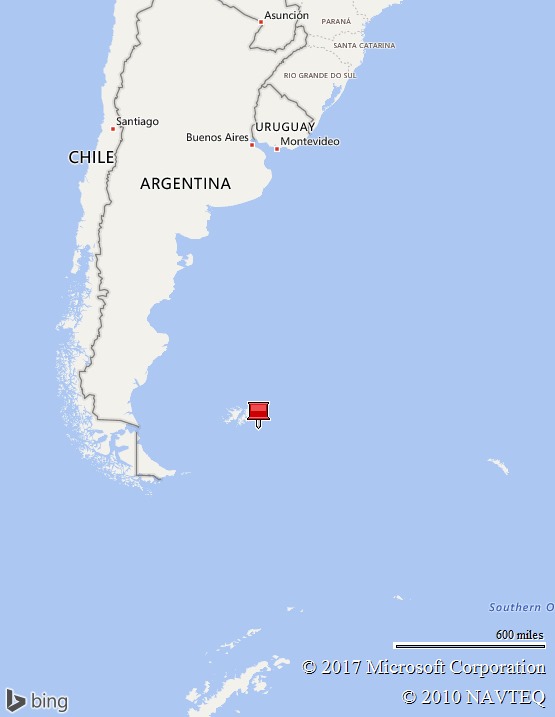When I first saw the Falkland Islands in 2007, I simply could not understand why two great nations would go to war over these barren rocks far out into the Atlantic Ocean. However, a war was indeed fought between Argentina and Great Britain in 1982, with the resulting loss of many lives on both sides. In a nutshell, even though the Falklands Crown colony since 1841, Argentina had long asserted their ownership of the territory, and in 1982, they launched an invasion which was successful in their assuming control of the islands. Great Britain responded by dispatching the Royal Navy, and in a series of decisive battles once again regained control over the islands. Sadly 649 Argentine military personnel were killed along with 255 British personnel and two Islanders. Even to this day, Argentina refuses to recognize the Falklands as a separate legal entity, and it has employed multiple strategies in an attempt to strangle the island economically. So for example, our ship having made a call in the Falklands cannot then proceed directly to Argentina, but first has to sail to another country.
But understand what the Falkland Islands are like. They are a barren, mostly treeless windswept landscape. There are two main islands, East Falklands and West Falklands, and then about 200 smaller islands all contained in the landmass slightly smaller than the state of Connecticut. Under the influence of the strong currents welling up from Antarctica, they have a cold Marine climate. The island is swept by strong westerly winds on most days, and it is cloudy and humid. Rain occurs roughly 50% of the time in these islands. So, the question is, why in the world would you fight a war over these islands?
Well, there are really two answers to that question. Back in 1982, Argentina was controlled by a military junta, and the country was generally in a state of economic decline. What better way to rouse the population than to start a war that was widely popular. The second reason is quite simple, money. At the time of the war, the island was probably home to more sheep than it was people. But an earlier survey that had been done by the British, showed that the island possessed significant economic resources if those resources were properly developed. First, and foremost among them, was control of the vast resources in the waters around these islands.
On the day that we visited, we had absolutely the best tour that I could imagine around the main City of Stanley. The sun was out, the winds were calm, and it was an absolutely beautiful day. The woman who was conducting our tour just happened to be chairwoman of the Chamber of Commerce. She was an encyclopedia of information on Falkland Islands history and economics. She pointed out all of the things that the island had undertaken since the war to gain control of its economic resources and to implement the economic plan outline so long ago by Great Britain. Today the island maintains a reserve on behalf of its residents of over $400 million. It has taken control of its economic zones in the ocean, and is receiving huge amounts of income from the sale of fishing rights to foreign entities. Oil has not only been discovered, but is being commercially exploited. The government has spent a great deal of money in the development of infrastructure for its people, and of resources to support tourism. All of these factors combined have produced a dramatically different city today than what I first encountered in 2007.
I’m sure that the beautiful weather helped contribute to my sunny attitude, but I was also quite impressed with what I saw, and with the rapid growth that is obviously occurring on the islands. We have departed Stanley and will be spending two days at sea towards our next destination which is the City of Montevideo in the country of Uruguay.
After I finished writing the other day, Lisa told me that she did not think I had done a good job of closing the story on my medical episode, and I’m guessing from what I’m hearing that is in fact true. So before rumor festers into fact, let me share the findings of my visit ashore in Ushuaia.
I underwent a urinalysis and blood work along with a CT scan of my abdomen. The urinalysis showed no blood, but some evidence of protein. The blood work had an increased white count, along with a higher than normal SED rate, but was otherwise unremarkable. The CT scan ruled out any abdominal issues, particularly there was no evidence of a tumor in neither the kidney nor the bladder. The conclusion of the local doctors was that I needed to be on a stronger antibiotic to treat a resistant urinary infection. When I returned to the ship, the Doctor here placed me on Cipro, and I can tell you that all of my symptoms have markedly improved today and that I think we’re definitely on the right track.
For those of you who are still scratching their heads wondering where all of the blood came from – I have an interesting story. Lisa and I spent many hours off the ship yesterday in Stanley and when we returned we both went to separate bathrooms to urinate. Afterwards, I appeared to once again have blood. Believe it or not when I got to Lisa, she had experienced the exact same situation. So – there is no way that each of us has some major problem. I haven’t completely figured out the answer, but there appears to be some chemical interaction with the cleaner this being used by the ship.
In any case we are both just fine, and at least I got my current CT scan to say that I’m in good health.
Jim
All pictures are up to date: http://theglobetrotters.phanfare.com
Blog library is current: http://www.theglobe-trotters.com




No comments:
Post a Comment